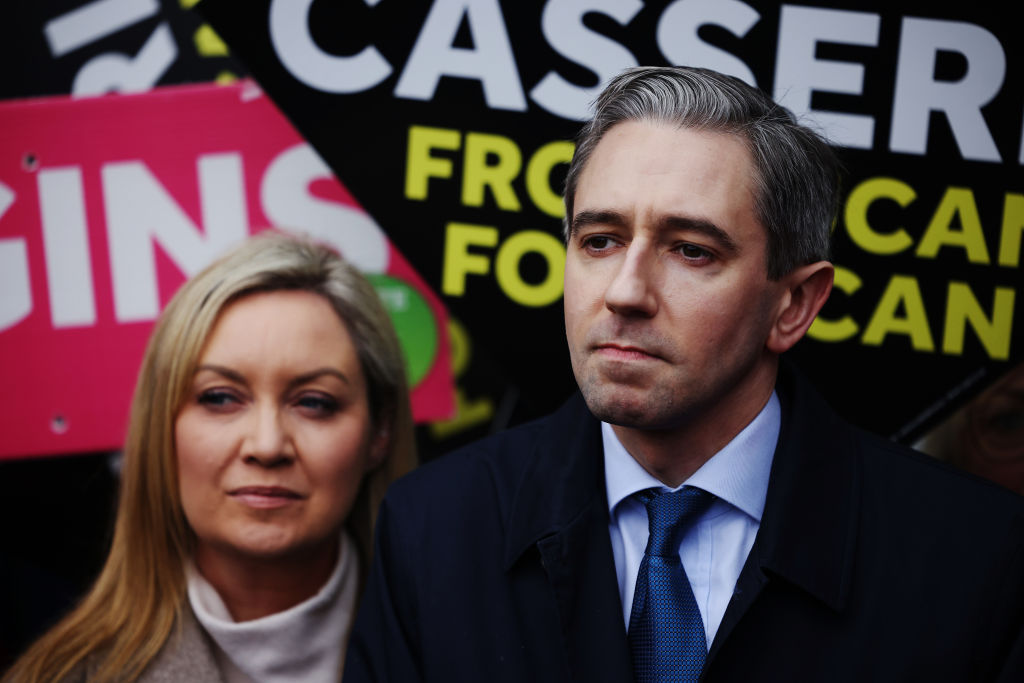On Saturday following Ireland’s general election, count centres were full of volunteers tallying votes on their clipboards. In Donegal, supporters of venerable candidate Pat “the Cope” Gallagher wore high-vis vests bearing the legends “Vote Cope” and even “Team Cope“. It was a welcome reminder that even in an election where the results seem to have changed so little, someone is always coping and someone seething. So who is who?
Sinn Féin’s (SF) vote appears to have held strong, and is likely to leave them on roughly the same number of seats as the two big legacy parties, Fianna Fáil (FF) and Fine Gael (FG). A coalition with either of those parties is unlikely, and in reality that’s what it would take to get Sinn Féin into government. The party’s leader, Mary Lou McDonald presented a bullish face to the press yesterday and announced her intention to seek to form a government by cobbling together enough support from smaller Left-leaning parties and independents, but it is not likely she will be successful.
What of those other legacy parties? In the days immediately before the election it appeared that Fianna Fáil was surging and Fine Gael was dropping precipitously. FF did come through with a strong showing but the FG collapse never emerged. The parties will be in a position to freeze out Sinn Féin and then reform their grand coalition, this time with the Social Democrats and/or Labour as junior partners. They are presentable and un-frightening Left-wing parties which either have a stated openness to go into power with the legacy parties or have done it before. In any case, the closeness of the results between the three largest parties means it will probably be the new year before a government is formed.
As usual, the fringes held the most interesting results. Radical Right-wing candidates have once again failed to make breakthroughs. In key areas like Dublin West and Dublin Central cumulative votes of such parties, though still in single figures, have grown noticeably in the last few years. The basis of a larger Right-wing and specifically anti-immigration movement is there but once again was thwarted by vote splitting among too many candidates, and an inability to secure transfers from other parties.
The failed bids include Malachy Steenson, the key mover behind the “Coolock Says No” protest and a recently elected councillor. Interestingly, Steenson’s vote was undercut by late entrant Gerry “The Monk” Hutch, a nationally known figure with a lengthy and gaudy criminal history. Hutch’s success is a salutary warning to the Right that while anti-establishment feeling in marginalised communities can be turned to ideological ends, it can just as often manifest as a middle finger to the system.
One of the few rays of light for any Right-inclined voters is that the third party currently in government, the Green Party, looks to be facing near-obliteration. The Greens and in particular their leader Roderick O’Gorman were the section of the government most closely associated with Ireland’s handling of refugees, immigration and housing during the last government. While it’s tempting to see this as a rebuke to immigration policy, there is a recurrent theme in Irish politics of the smallest party in coalition facing obliteration at the polls. The Green Party’s decline should be understood in that context.
So, what does it all mean for Ireland’s future? From the outside it seemed that this was an election where cultural issues combined with the housing crisis would finally break the stranglehold of consensus politics in Ireland. More than a few people inside Ireland at either end of the partisan spectrum hoped the same, but that hope felt increasingly desperate as a sleepy campaign proceeded, obsessed with trivialities and managing the surface appearance rather than the true substance of various crises.
In a strange way the sleepiness of the contest provided its own sense of closure. Maybe it’s a side effect of the siphoning off of youthful vigour represented by emigration, but radical change isn’t coming to Ireland. Despite their protestations, most voters are at peace with that. But the fact that voters and the system have chosen to sleep through the storm doesn’t mean it’s gone away. Ireland’s economic model is under direct threat from a protectionist US regime, and on the key issues of immigration and asylum they have grown noticeably out of step with the mainstream of European opinion.That’s bad news for a country that has made faithful advocacy of the EU’s goals a key feature of its success.
The fact that neither of these were discussion points during the election is revealing — all parts of the political system decided it was better to hope those storms blow themselves out than to get everyone riled up by addressing them. In time, Ireland may look back on this election as the last chance to grasp those nettles, a chance the system and people both passed on, to who knows what end.











Join the discussion
Join like minded readers that support our journalism by becoming a paid subscriber
To join the discussion in the comments, become a paid subscriber.
Join like minded readers that support our journalism, read unlimited articles and enjoy other subscriber-only benefits.
Subscribe